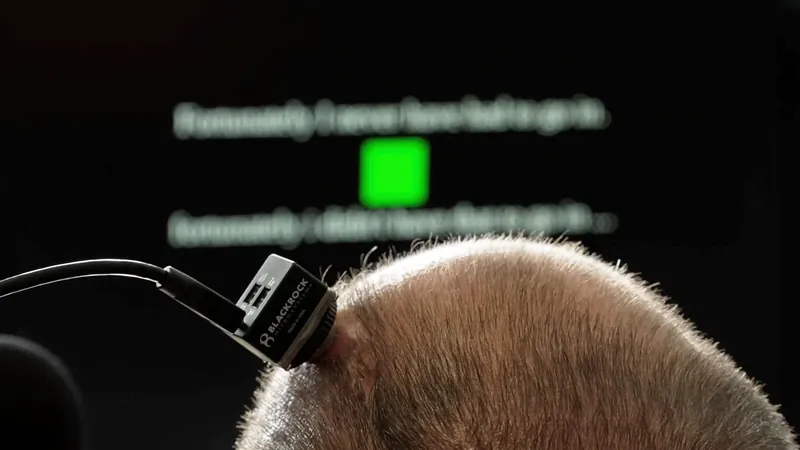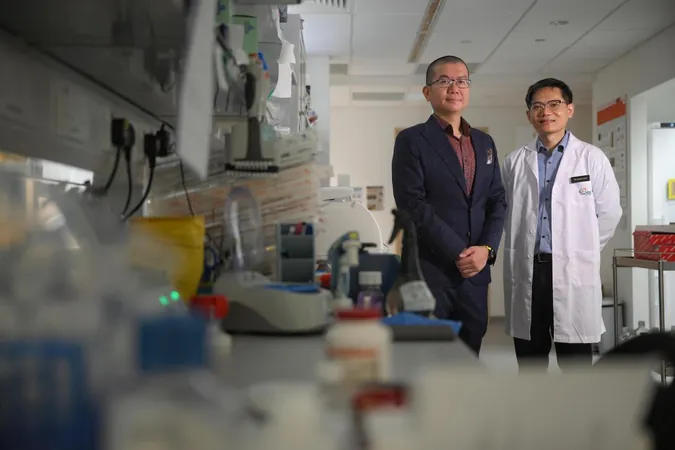
Revolutionary Brain-Computer Interface Lets ALS Patient Speak in Real-Time!
2025-06-13
Author: Rajesh
A Breakthrough in Communication Technology
In an astonishing breakthrough reported in the journal "Nature," researchers have unveiled a cutting-edge brain-computer interface (BCI) that enables real-time speech for a patient with amyotrophic lateral sclerosis (ALS), effectively crafting a digital vocal tract.
Speaking Instantly with a Computer
This innovative system allowed the participant to engage in live conversations with his family, altering his tone and even "singing" simple melodies. Sergey Stavisky, a leading researcher from UC Davis, likens this advancement to the leap from text messaging to phone calls, stating, "This new real-time voice synthesis allows users to participate in conversations seamlessly, without the frustrating delays of previous technologies."
Decoding Speech from Brain Activity
Enrolled in the BrainGate2 clinical trial at UC Davis Health, the ALS patient’s ability to communicate stemmed from a specialized BCI. This device comprises four microelectrode arrays implanted in the speech-producing sector of the brain. These arrays capture neuronal activity and relay it to computers that translate these signals into speech.
Navigating the Challenges of Real-time Speech
"The main challenge for synthesizing voice in real-time was determining precisely when the patient intended to speak," explained project scientist Maitreyee Wairagkar. Advanced algorithms were created to map these neural activities to actual sounds, enabling the participant to control the pitch and tempo of his synthesized voice.
Transforming Thought into Voice in a Heartbeat
This remarkable BCI translated the subject's brain signals into comprehensible speech at lightning speed—just one-fortieth of a second! The technology even permitted the patient to utter new words and adjust his intonation, allowing for questions and emphatic statements.
A Voice with Substance and Nuance
With this system, listeners could understand nearly 60% of the synthesized speech—far surpassing the mere 4% comprehensibility when the BCI was inactive. Furthermore, the participant was able to express differing pitches and even sing short melodies.
AI-Powered Algorithms at Work
The success of this instantaneous speech synthesis is attributed to sophisticated AI algorithms trained with the participant's brain data, gathered while he attempted to speak phrases displayed on a screen.
Hope for Those Who Can't Speak
David Brandman, co-director of the UC Davis Neuroprosthetics Lab and the neurosurgeon behind the implantation, emphasizes the significance of voice in identity: "Losing the ability to communicate is a devastating experience for those with neurological conditions. This research provides hope, showcasing how we can empower paralyzed individuals to find their voice once again."
The Path Ahead for this Groundbreaking Technology
Despite the hopeful developments, the study's findings are preliminary, having been conducted on just one ALS participant. Future research will need to replicate these results on a larger scale, including individuals with speech loss from diverse causes, like strokes.
Join the Revolution!
The BrainGate2 trial is currently seeking participants eager to explore this transformative technology. To learn more about participating in this groundbreaking study, visit braingate.org or contact them directly.



 Brasil (PT)
Brasil (PT)
 Canada (EN)
Canada (EN)
 Chile (ES)
Chile (ES)
 Česko (CS)
Česko (CS)
 대한민국 (KO)
대한민국 (KO)
 España (ES)
España (ES)
 France (FR)
France (FR)
 Hong Kong (EN)
Hong Kong (EN)
 Italia (IT)
Italia (IT)
 日本 (JA)
日本 (JA)
 Magyarország (HU)
Magyarország (HU)
 Norge (NO)
Norge (NO)
 Polska (PL)
Polska (PL)
 Schweiz (DE)
Schweiz (DE)
 Singapore (EN)
Singapore (EN)
 Sverige (SV)
Sverige (SV)
 Suomi (FI)
Suomi (FI)
 Türkiye (TR)
Türkiye (TR)
 الإمارات العربية المتحدة (AR)
الإمارات العربية المتحدة (AR)